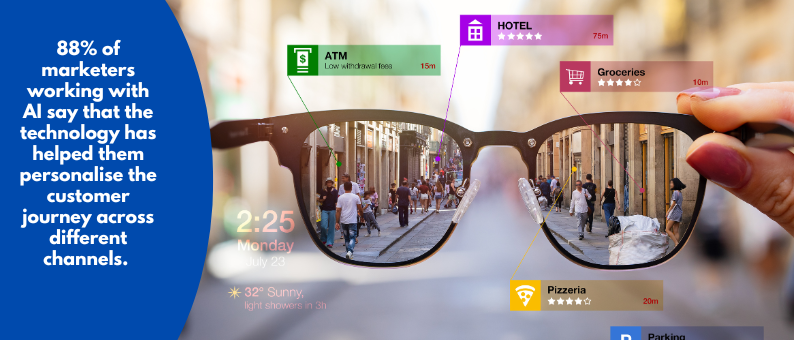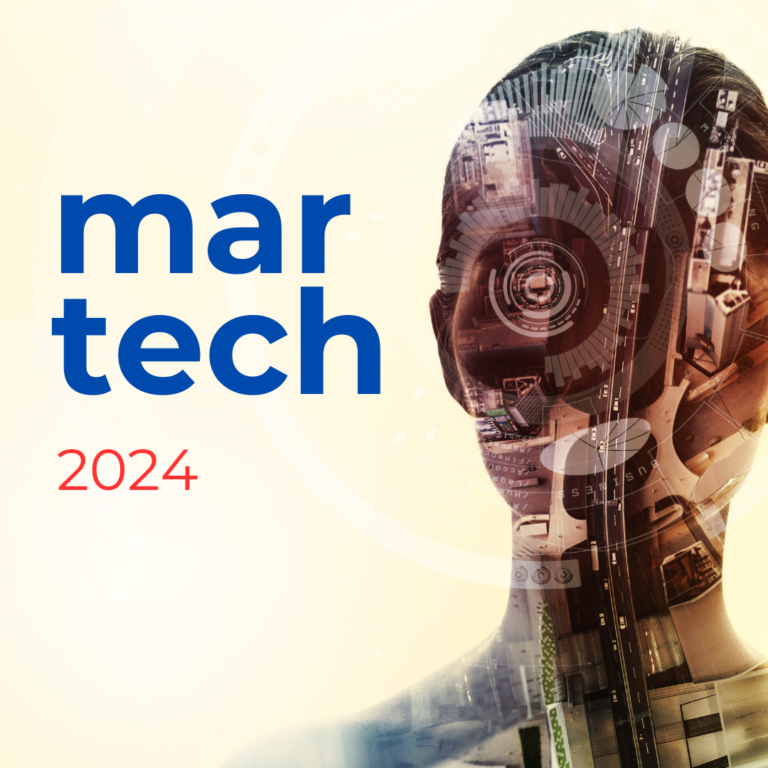In the dynamic world of marketing, staying ahead of the curve means embracing the latest and most innovative technologies. As we move into the second half of 2024, several groundbreaking tools and trends are poised to redefine the marketing landscape. This article delves into the most promising marketing technologies that businesses should consider integrating into their strategies to remain competitive and relevant.
1. Artificial Intelligence and Machine Learning
Artificial Intelligence (AI) and Machine Learning (ML) continue to revolutionise the marketing industry, offering unprecedented opportunities for personalisation and efficiency. These technologies enable marketers to deliver tailored experiences at scale, optimising customer engagement and driving higher conversion rates.
Applications of AI and ML in Marketing:
- Predictive Analytics: AI-driven predictive analytics can analyse vast amounts of historical data to forecast future consumer behaviours and trends. This capability allows marketers to anticipate customer needs and preferences, thereby crafting more targeted and effective campaigns.
- Chatbots and Virtual Assistants: AI-powered chatbots and virtual assistants provide real-time customer support and personalized recommendations. These tools enhance user engagement by offering immediate, relevant responses, leading to higher satisfaction and retention rates.
- Content Creation: Advanced natural language processing models, such as GPT-4, can generate high-quality content, from blog posts and social media updates to product descriptions and email newsletters. This automation saves time and resources while maintaining consistency and quality across various channels.
- Personalised Marketing: Machine learning algorithms can segment audiences based on behavior, preferences, and demographics, enabling highly personalized marketing efforts. Personalized emails, product recommendations, and targeted advertisements are just a few examples of how AI can enhance customer experiences.
2. Augmented Reality (AR) and Virtual Reality (VR)
Augmented Reality (AR) and Virtual Reality (VR) are transforming the way consumers interact with brands, offering immersive experiences that drive engagement and conversions. These technologies provide unique opportunities for marketers to create memorable and interactive campaigns.

Applications of AR and VR in Marketing:
- Virtual Try-Ons: Fashion, beauty, and eyewear brands use AR to allow customers to virtually try on products. This technology helps bridge the gap between online and offline shopping experiences, reducing return rates and increasing customer confidence in their purchases.
- Interactive Product Demonstrations: VR enables brands to create immersive product demonstrations and virtual showrooms. For example, automotive companies can offer virtual test drives, and real estate firms can provide virtual tours of properties, giving customers a realistic feel of the product without leaving their homes.
- Enhanced Brand Storytelling: AR and VR facilitate interactive storytelling, enabling brands to create rich, engaging narratives. For instance, tourism companies can offer virtual tours of destinations, while heritage brands can create immersive experiences that highlight their history and craftsmanship.
- Gamified Marketing Campaigns: Brands can use AR and VR to gamify marketing campaigns, offering interactive games and challenges that engage users and encourage social sharing. This approach not only entertains but also fosters deeper connections with the brand.
3. Voice Search Optimisation
The rise of smart speakers and voice assistants such as Amazon Alexa, Google Assistant, and Apple Siri is reshaping the way consumers search for information and make purchases. As voice search becomes more prevalent, optimizing for voice queries is crucial for staying competitive.
Strategies for Voice Search Optimization:
- Long-Tail Keywords and Natural Language: Voice searches tend to be longer and more conversational than text searches. Marketers should focus on incorporating long-tail keywords and natural language phrases into their content to match the way people speak.
- Featured Snippets and Structured Data: Voice assistants often pull information from featured snippets. Ensuring that your content is structured to appear in these snippets can improve your chances of being selected as the voice search result.
- Local SEO Optimisation: Many voice searches are location-specific, such as “best coffee shop near me.” Optimizing for local SEO by claiming your Google My Business listing, using local keywords, and encouraging customer reviews can enhance visibility in voice search results.
- Mobile Optimisation: Since many voice searches are conducted on mobile devices, ensuring that your website is mobile-friendly is essential. Fast loading times, easy navigation, and responsive design contribute to a better user experience and higher search rankings.
4. Blockchain Technology
Blockchain technology, best known for its role in cryptocurrencies, is gaining traction in the marketing world for its potential to enhance transparency, security, and trust. This decentralized technology offers several innovative applications for marketers.
Applications of Blockchain in Marketing:
- Ad Fraud Prevention: Blockchain can help combat ad fraud by providing a transparent and verifiable record of ad impressions and clicks. This ensures that advertisers only pay for genuine interactions, improving the overall efficiency of digital advertising.
- Transparent Supply Chains: Blockchain can track the journey of products from manufacture to sale, providing transparency and authenticity. This is particularly valuable for industries such as food, luxury goods, and pharmaceuticals, where product origin and integrity are critical.
- Consumer Data Protection: Blockchain allows consumers to control their personal data and share it securely with brands. This not only enhances data privacy but also builds trust, as consumers are more likely to engage with brands that respect their privacy and provide clear data usage policies.
- Loyalty Programs: Blockchain can streamline and secure loyalty programs by creating a transparent and immutable record of points and transactions. This ensures that customers can easily redeem rewards and trust the integrity of the program.
5. Programmatic Advertising
Programmatic advertising leverages AI to automate the buying and placement of ads, enabling more precise targeting and real-time bidding. This approach is becoming increasingly sophisticated, offering new levels of efficiency and effectiveness.
Innovations in Programmatic Advertising:
- Dynamic Creative Optimisation (DCO): DCO uses AI to automatically personalize ads based on user data, such as demographics, browsing behaviour, and purchase history. This results in highly relevant and engaging advertisements that resonate with individual users.
- Contextual Targeting: With growing concerns over privacy and the decline of third-party cookies, contextual targeting is gaining prominence. This technique places ads based on the content of the webpage rather than user data, ensuring relevance while respecting privacy.
- Omni-Channel Programmatic: Programmatic advertising is expanding beyond digital to include traditional media channels such as TV, radio, and out-of-home advertising. This omni-channel approach allows marketers to deliver consistent and coordinated messages across various touchpoints.
- Advanced Attribution Models: Programmatic platforms are incorporating advanced attribution models that provide deeper insights into the customer journey. This helps marketers understand the impact of different touchpoints and optimize their campaigns for better performance.
6. 5G Technology
The rollout of 5G networks is set to revolutionize mobile marketing by providing faster speeds, lower latency, and enhanced connectivity. This technological leap opens up new possibilities for engaging and interactive marketing experiences.
Impact of 5G on Marketing:
- High-Quality Video Streaming: With improved video quality and seamless streaming, 5G enables marketers to deliver rich and engaging video content. This includes live streaming events, interactive video ads, and high-definition video marketing campaigns.
- Enhanced AR and VR Experiences: The increased bandwidth and reduced latency of 5G make AR and VR experiences more accessible and enjoyable on mobile devices. Brands can leverage these technologies to create immersive and interactive campaigns that captivate audiences.
- Real-Time Interactivity: 5G supports real-time interactions, such as live shopping events, interactive polls during broadcasts, and real-time customer support. These features enhance user engagement and create more dynamic and responsive marketing experiences.
- IoT Integration: 5G facilitates the integration of Internet of Things (IoT) devices, enabling more connected and intelligent marketing solutions. Smart home devices, wearables, and connected vehicles offer new channels for delivering personalized and contextually relevant messages.
7. Internet of Things (IoT)
The Internet of Things (IoT) refers to the network of interconnected devices that collect and exchange data. This technology is creating new opportunities for marketers to connect with consumers in innovative ways.
Applications of IoT in Marketing:
- Smart Home Devices: Marketers can reach consumers through smart appliances and home assistants. For example, a smart refrigerator can suggest recipes based on its contents, and a smart speaker can provide personalized recommendations and special offers.
- Wearable Technology: Wearables such as fitness trackers and smartwatches collect valuable data on user activity and health. Brands can use this information to deliver personalized marketing messages, such as fitness tips, product recommendations, and targeted promotions.
- Proximity Marketing: IoT devices enable proximity marketing through technologies like Bluetooth beacons. These devices can detect when a consumer is near a specific location, such as a retail store, and send targeted messages or offers to their mobile device.
- Connected Vehicles: As cars become more connected, they offer new marketing opportunities. Brands can deliver location-based offers, in-car entertainment options, and personalized recommendations based on driving habits and preferences.
8. Advanced Analytics and Big Data
The ability to collect, analyze, and act on vast amounts of data is crucial for modern marketing. Advanced analytics and big data technologies are providing deeper insights and more precise targeting capabilities.
Applications of Advanced Analytics in Marketing:
- Customer Journey Analytics: Advanced analytics tools track and analyse every touchpoint in the customer journey, providing insights into behaviour and preferences. This helps marketers understand the factors that influence purchase decisions and optimize their strategies accordingly.
- Sentiment Analysis: AI-powered sentiment analysis tools can gauge public opinion and sentiment towards a brand or product by analyzing social media posts, reviews, and other user-generated content. This information helps brands tailor their messaging and address any negative perceptions.
- Predictive Modeling: Predictive modeling uses historical data to forecast future trends and behaviors. Marketers can use these models to anticipate customer needs, optimize inventory levels, and plan effective marketing campaigns.
- Behavioural Targeting: By analysing user behaviour, such as browsing history and purchase patterns, marketers can create highly targeted campaigns that resonate with specific segments. This approach increases relevance and improves conversion rates.
- A/B Testing and Optimization: Advanced analytics platforms enable continuous testing and optimization of marketing campaigns. Marketers can experiment with different variations of ads, emails, and landing pages to identify the most effective elements and improve performance.
9. Marketing Automation Platforms
Marketing automation platforms are becoming more powerful and accessible, enabling marketers to streamline their workflows and deliver personalized experiences at scale.
Features of Modern Marketing Automation Platforms:
- Integrated Campaign Management: Comprehensive marketing automation platforms offer integrated solutions that encompass email marketing, social media management, CRM, and analytics. This allows marketers to manage all aspects of their campaigns from a single dashboard.
- Lead Scoring and Nurturing: Automation tools use AI to score leads based on their likelihood to convert and automate personalized follow-up actions. This ensures that high-potential leads receive timely and relevant communications, increasing the chances of conversion.
- Multi-Channel Automation: Modern platforms support automation across multiple channels, including email, SMS, social media, and web. This enables marketers to create cohesive and consistent experiences for their audience, regardless of the channel they use.
- Personalization and Dynamic Content: Automation tools can dynamically personalize content based on user data, such as preferences, behavior, and demographics. This results in more relevant and engaging communications that resonate with individual users.
- Analytics and Reporting: Marketing automation platforms provide detailed analytics and reporting features, allowing marketers to track the performance of their campaigns and make data-driven decisions. These insights help optimize strategies and improve ROI.
10. Sustainability and Ethical Marketing Technologies
Consumers are increasingly demanding that brands act responsibly and sustainably. Technologies that support sustainability and ethical practices are gaining importance, helping brands build trust and loyalty.
Applications of Sustainable and Ethical Marketing Technologies:
- Sustainable Ad Platforms: These platforms prioritize eco-friendly practices, such as reducing carbon footprints and promoting sustainable products. Brands can use these platforms to align their advertising efforts with their sustainability goals.
- Ethical AI: Ensuring that AI algorithms are free from bias and used ethically is becoming a priority for brands. Ethical AI practices involve transparency, accountability, and fairness, helping brands build trust and avoid potential reputational risks.
- Green Marketing Campaigns: Technologies that support green marketing initiatives, such as sustainable packaging, carbon offset programs, and eco-friendly product design, are becoming more prevalent. Brands can leverage these technologies to communicate their commitment to sustainability and attract eco-conscious consumers.
- Corporate Social Responsibility (CSR) Platforms: CSR platforms enable brands to manage and track their social and environmental impact. These tools help brands report on their CSR activities, engage stakeholders, and demonstrate their commitment to ethical practices.
Conclusion
As we navigate 2024, the landscape of marketing continues to evolve at a rapid pace, driven by technological advancements. The innovative marketing technologies discussed in this article offer exciting opportunities for businesses to connect with their audiences in more meaningful and effective ways. By staying abreast of these trends and integrating the right tools into their strategies, marketers can drive better results and maintain a competitive edge.
Embracing these advancements will not only enhance customer experiences but also lead to more efficient and impactful marketing efforts. Whether it’s leveraging AI for personalized marketing, utilizing AR and VR for immersive experiences, or adopting sustainable practices, the future of marketing is bright and full of possibilities. As technology continues to evolve, marketers must remain agile and open to innovation, constantly seeking new ways to engage and delight their customers.
FAQ’s about marketing technology
The top innovative marketing technologies for 2024 include Artificial Intelligence (AI), Machine Learning (ML), Augmented Reality (AR), Virtual Reality (VR), voice search optimization, blockchain technology, programmatic advertising, 5G technology, Internet of Things (IoT), advanced analytics, and marketing automation platforms.
AI and ML can enhance marketing strategies by enabling predictive analytics, automating content creation, personalizing customer interactions through chatbots, and segmenting audiences for targeted campaigns, ultimately improving engagement and conversion rates.
AR and VR are used in marketing for virtual try-ons, interactive product demonstrations, immersive brand storytelling, and gamified marketing campaigns, providing engaging and memorable experiences that drive customer interaction and sales.
Voice search optimisation is crucial as more consumers use smart speakers and voice assistants. Optimising content for voice search with natural language and long-tail keywords can enhance visibility and capture voice search traffic, improving overall SEO performance.
Blockchain technology enhances marketing by preventing ad fraud, ensuring transparent supply chains, protecting consumer data, and streamlining loyalty programs. This builds trust with consumers and improves the efficiency of digital advertising.
Programmatic advertising automates the buying and placement of ads using AI for precise targeting and real-time bidding. It is evolving to include dynamic creative optimisation, contextual targeting, omni-channel approaches, and advanced attribution models.
5G technology will revolutionize mobile marketing by enabling high-quality video streaming, enhanced AR and VR experiences, real-time interactivity, and better integration with IoT devices, creating more engaging and dynamic marketing campaigns.
IoT plays a significant role in marketing by enabling smart home devices, wearables, proximity marketing, and connected vehicles to collect data and deliver personalised, contextually relevant messages to consumers, enhancing engagement and targeting.
Advanced analytics and big data provide insights into customer behaviour, preferences, and sentiment, enabling personalized targeting, predictive modelling, and continuous optimization through A/B testing, resulting in more effective and data-driven marketing strategies.
Marketing automation platforms streamline workflows, integrate campaign management, automate lead scoring and nurturing, support multi-channel automation, personalise content, and provide detailed analytics, enhancing efficiency and effectiveness in marketing efforts.
Marketers can incorporate sustainability and ethical practices by using sustainable ad platforms, ensuring ethical AI usage, launching green marketing campaigns, and leveraging CSR platforms to track and report social and environmental impact, building trust and loyalty with consumers.








